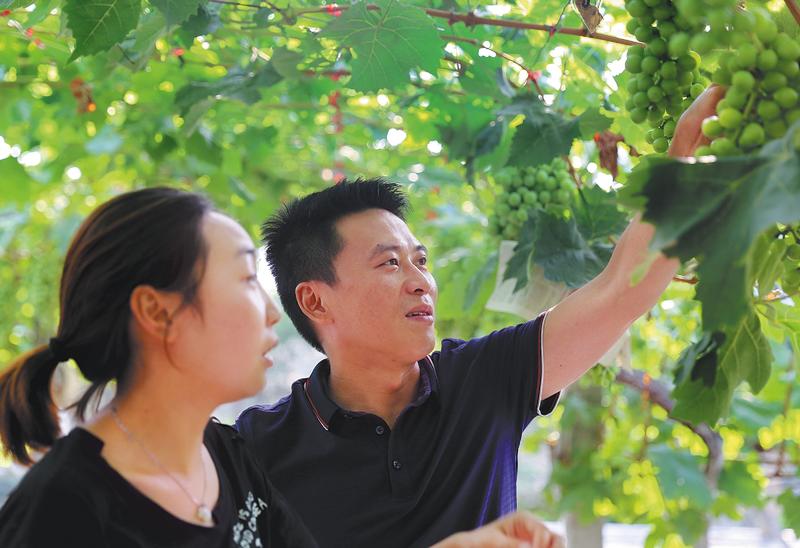Zhang Xiong traveled home from the big city enticed by possibility, but it was just the beginning of a long journey from loss to redemption, Wang Ru reports.
 Zhang Xiong (right), resident of Guoyuan village, Meishan city, Sichuan province, tells fellow village resident Liu Xia how to grow grapes. (PHOTO PROVIDED TO CHINA DAILY)
Zhang Xiong (right), resident of Guoyuan village, Meishan city, Sichuan province, tells fellow village resident Liu Xia how to grow grapes. (PHOTO PROVIDED TO CHINA DAILY)
Editor's note: A xiaokang society, or a moderately prosperous society, has been the dream of Chinese people for thousands of years. Our reporters travel around the country to cover the arduous efforts being made in order to realize the dream.
Back in 2010, 24-year-old Zhang Xiong was already leading a comfortable life since leaving his hometown in Guoyuan village, Meishan city, Sichuan province, after several years of struggling to establish himself in Beijing.
At that time, data released by the Beijing Municipal Bureau of Statistics showed that the average annual income in the city was 50,415 yuan (US$7,201), but Zhang, who worked at electronics manufacturer Hon Hai group, was making around 240,000 yuan each year.
However, it didn't stop him from giving up his job and returning to his hometown to grow grapes. The decision changed his life in both positive and negative ways, but growing grapes finally led him out of the hardest time of life.
Standing in his vineyard, Zhang recalls why he went back home 10 years ago. "At that time, my village held a seminar about migrant workers every Lunar New Year holiday. From such a seminar, I heard the local government appeal to villagers who had migrated to other areas to return and engage in grape planting, and they would provide favorable policies, technical support and good sales channels.
"My family grew grapes in the 1990s. Although we didn't receive much income from it, since we grew in the open air without enough technical skill, I still had an obsession with it and it held a lot of appeal."
 Zhang at work in his vineyard. (PHOTO PROVIDED TO CHINA DAILY)
Zhang at work in his vineyard. (PHOTO PROVIDED TO CHINA DAILY)
Carrying both the savings he accumulated in Beijing and his enormous enthusiasm, he went back home and was quickly engaged with his grape farming. His family had 0.19 hectares of land at that time, and he took part in technical training and learned how to build a brand.
Just as he was starting out on his new journey, however, life dealt him a heavy blow. In 2010, while walking in the road, he was knocked down by an electro-tricycle, which smashed his right kneecap and resulted in a spiral of unwanted consequences. The injury cost all of his savings and more, forcing him into a debt of 400,000 yuan, before, ultimately being registered as a poor household in the village.
"That was when my wife left me, believing I would not be able to pay off the debt. I felt so desperate that I considered giving up and selling the vineyard," says Zhang.
When village officials became aware of Zhang's desperate situation, they ensured he would receive funding and technical assistance, which dispelled his misgivings. They helped Zhang to secure a loan of 80,000 yuan with the village as the guarantor, and one-to-one technical support from fellow villager and successful grape farmer, Yang Zhiming. Yang would visit Zhang's vineyard to check on his grape crops, and offered Zhang a wealth of advice and grape-cultivating knowledge.
After receiving Yang's guidance and other training, Zhang set up rain shelters for his grapes, instead of growing them in the open air. The first harvest earned him 60,000 yuan, which offered him new hope for the future.
With the proper skills, the quality and quantity of his grapes continued to improve, until he gradually enlarged the size of his vineyard to 4.47 hectares.
"Within just two years, I paid off the debt, and can earn about 1 million yuan each year now," says Zhang.
With an annual grape festival held in Guoyuan village attracting many people, sales channels for his grapes are always ensured.
"This year's grapes have already been ordered by a company in Sichuan," he says.
 Zhang's vineyard. (PHOTO PROVIDED TO CHINA DAILY)
Zhang's vineyard. (PHOTO PROVIDED TO CHINA DAILY)
Altogether about 200 Guoyuan villagers who migrated to other places for work have returned and joined the grape industry. Besides people like Zhang who manage a family vineyard, there are many others who engage in processing the harvested fruit and selling it. The village now has a total of 346.7 hectares of grape vines, and cultivates more than 40 types.
Yu Weizhong, 46-year-old villager who, like Zhang, returned home to grow grapes in 2013, earns around 700,000 yuan each year now.
"Since I can get a good income by working at home, it made sense to come back. Growing grapes in our village has good prospects, and some of my friends also want to come here to grow grapes," says Yu.
According to Li Yongwei, the Party chief of Guoyuan village, the climate of the village is not ideal for growing grapes, but they have actively explored advanced cultivation techniques since the 1990s.
"In the 1990s, many villagers grew grapes, but the quality was not satisfactory. So, we sent village officials to learn and gain experience from other places, who then guided villagers to grow different breeds. Now we have explored leading grape growing techniques in China and we can control the yield of grapes in less than 1,500 kilograms per mu (0.067 hectare) and set unified standards to ensure quality," says Li.
After achieving enough experience himself, Zhang has considered how he can help others. "Since I received tremendous assistance, I also want to help those in need, and show them a way out of poverty. I was poor, and can totally understand the desire of those in poorer households to live a better life."
He applied to help four poor households. With his aid, the households have all lifted themselves from poverty.
In the future, he hopes to restructure his vineyard and install a fully automatic control system to reduce manpower and improve quality of the grapes.
He has also remarried.
He is quite satisfied with his life now, saying: "I have planted a good fruit, married a good wife, had a good boy, bought a good house, and I drive a good car and live a good life."
Contact the writer at wangru1@chinadaily.com.cn



